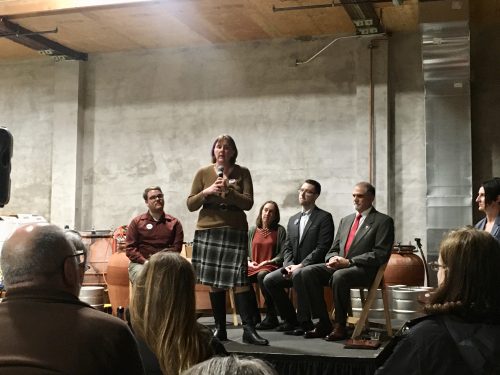
While the Democratic Party presidential primary debate was in full swing, Eugene City Council Ward 1 and Ward 8 candidates took to their own debate stage on Tuesday, Jan. 14, to discuss housing issues in Eugene.
The event was hosted by the Eugene Association of Realtors, and it gave the five candidates an opportunity to publicly present their positions on affordable housing, neighborhoods and homelessness at Civic Winery downtown.
About 100 people filled the concrete warehouse area in the back of the winery for the debate. The candidates sat on chairs on a small stage that was half lit by lightly flickering fluorescent lights, while the attendees sipped wine and ate crackers, cheeses and other provided snacks.
Ward 1 was represented by candidates Tim Morris, Eliza Kashinsky and incumbent Emily Semple. In Ward 2, Chris Pryor previously announced he wasn’t going to seek re-election, leaving an open seat for either Ryan Moore or Randy Groves who were both present to discuss their positions.
The debate format was that when a question was asked, each candidate took a turn to answer and spoke for about two minutes. Throughout the night the audience applauded statements they agreed with.
As expected, Groves spoke on his time as the former chief of Eugene-Springfield Fire. He touched on his experience of working with the two city governments during the merger of the two fire departments and overcoming conflict during that time.
“I’m motivated by the youth to make Eugene a better place than it is today,” he added.
Semple also relied on her past — and current — experiences as a sitting city councilor. She approached questions cautiously and honestly, pointing out the difficulties of working in city government.
When asked about Oregon HB 2001, which will end single-family dwelling zoning and allow neighborhoods to have more density when it comes to housing. They were asked if the city should draft its own code, or use the state’s model code.
Kashinsky was quick to defend Eugene’s uniqueness and the importance of being able to reflect that in zoning code.
“When I’m stressed out, I read the zoning code. Our code is unique, we need to draft our own code,” she says.
Everyone else agreed Eugene should adopt its own code for HB 2001, except for Semple, who says she believes it’s OK to use the state’s default code as a framework.
On other housing questions, both Morris and Moore cited their experience working with the Springfield Eugene Tenant Association. Moore mentioned multiple times that housing issues are what he is passionate about.
“I’m the only candidate in Ward 8 that can push for solutions,” he says. “I’ve been working on housing issues. It’s personal to me.”
Although the debate covered housing-specific issues, they also answered a question about homelessness. Both Semple and Groves discussed prevention by stepping in to help those who are at risk, and the rest of the candidates mentioned the importance of the TAC report. Moore called the council out for not having enough urgency, and says the city should take more action on implementing the report.
At the end, each candidate had a chance to answer the question central to any campaign — why them? Everyone won applause by giving impassioned answers on how, as councilors, they wanted to help the housing crisis in Eugene and make it a better place.